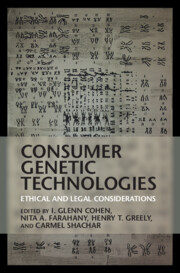Book contents
- Consumer Genetic Technologies
- Consumer Genetic Technologies
- Copyright page
- Contents
- Contributors
- Acknowledgments
- Introduction
- Part I Consumer Genetic Technologies: Rights, Liabilities, and Other Obligations
- Part II Privacy in the Age of Consumer Genetics
- Part III Tinkering with Ourselves: The Law and Ethics of DIY Genomics
- Part IV Consumer Genetics and Identity
- Introduction to Part IV
- 13 Generational Failures of Law and Ethics
- 14 Precision Medicine and the Resurgence of Race in Genomic Medicine
- 15 Losing Our Minds?
- 16 Investigative Genetic Genealogy and the Problem of Familial Forensic Identification
- Part V The Impact of Genetic Information
16 - Investigative Genetic Genealogy and the Problem of Familial Forensic Identification
from Part IV - Consumer Genetics and Identity
Published online by Cambridge University Press: 27 August 2021
- Consumer Genetic Technologies
- Consumer Genetic Technologies
- Copyright page
- Contents
- Contributors
- Acknowledgments
- Introduction
- Part I Consumer Genetic Technologies: Rights, Liabilities, and Other Obligations
- Part II Privacy in the Age of Consumer Genetics
- Part III Tinkering with Ourselves: The Law and Ethics of DIY Genomics
- Part IV Consumer Genetics and Identity
- Introduction to Part IV
- 13 Generational Failures of Law and Ethics
- 14 Precision Medicine and the Resurgence of Race in Genomic Medicine
- 15 Losing Our Minds?
- 16 Investigative Genetic Genealogy and the Problem of Familial Forensic Identification
- Part V The Impact of Genetic Information
Summary
In 2017, personal genetics company 23andMe announced that it had received FDA approval to provide people with their apolipoprotein E (APOE) genotype and nine other genes linked with health risks. The APOE gene is associated with late-onset Alzheimer’s disease (AD), the leading cause of dementia.In this chapter, I argue that APOE testing is of limited clinical significance given the present lack of disease-modifying therapies for AD and the fact that preventive measures are the same regardless of an individual’s APOE status.Nevertheless, an APOE result can have great personal and legal significance to individuals–for instance, influencing decision-making around insurance, employment, end-of-life care.One way to reconcile the obvious tension between paternalism and the individual’s right to know their genetic risk for late-onset AD is to provide genetic information in the context of robust information about the personal and legal ramifications of the result.This, I argue, is an area were 23andMe and other DTC genetic testing companies fall short.
- Type
- Chapter
- Information
- Consumer Genetic TechnologiesEthical and Legal Considerations, pp. 211 - 228Publisher: Cambridge University PressPrint publication year: 2021

